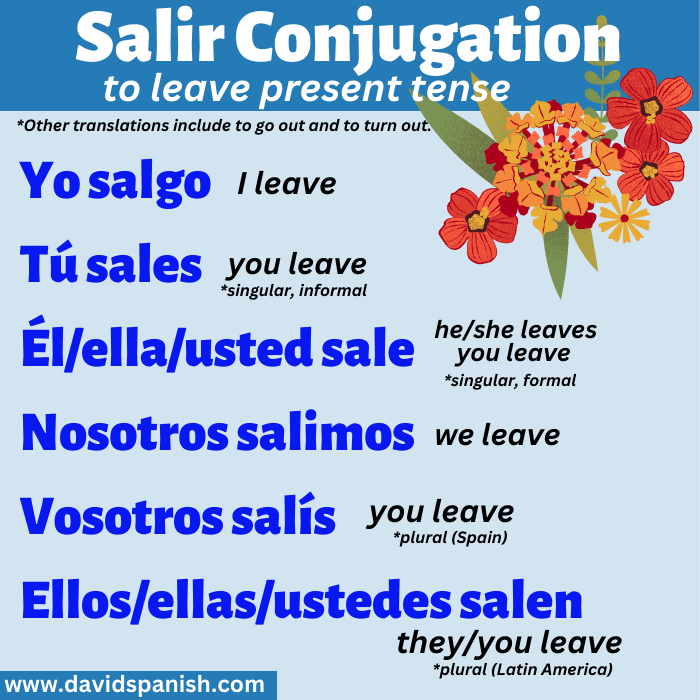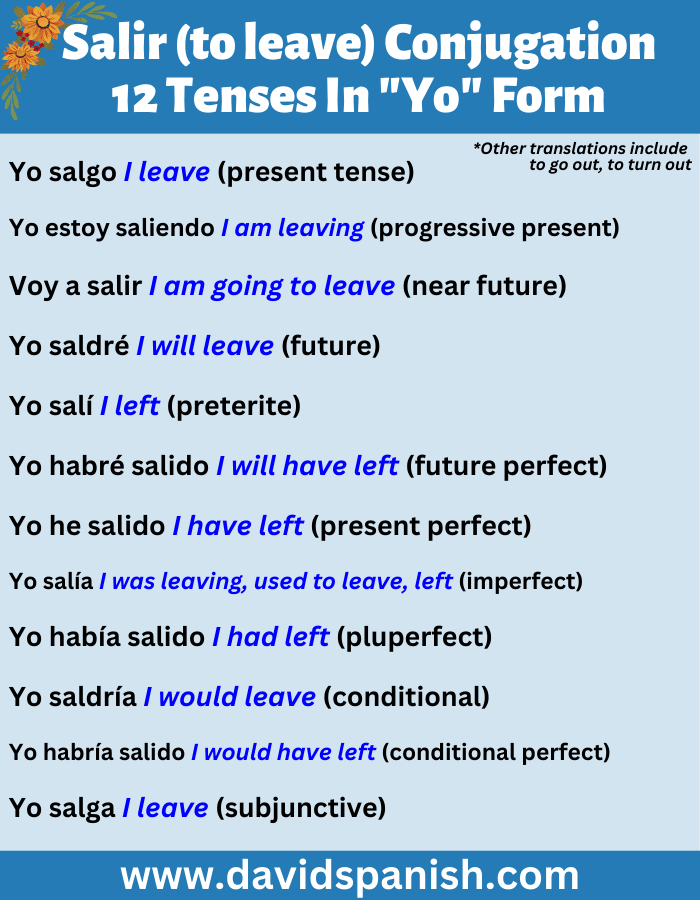Salir means both “to leave” and “to go out” in Spanish. The conjugation of salir in the present tense is: Yo salgo (I leave), tú sales (you leave), él/ella/usted sale (he, she leaves; you leave), nosotros salimos (we leave), vosotros salís (you leave) and ellos/ellas/ustedes salen (they/you leave).

Salir is an irregular IR verb. While its endings are the same as other regular IR verbs when conjugated in the present tense, it has an irregularity in the stem of the first-person singular (yo) form.
Salir conjugation in the present tense

Further down the page we offer conjugation charts for salir in the following major Spanish verb tenses:
- Present tense (presente de indicativo)
- Progressive present (presente progresivo)
- Near future (futuro inmediato)
- Future tense (futuro)
- Preterite (pretérito)
- Present perfect indicative (perfecto de indicativo)
- Imperfect (imperfecto de indicativo)
- Conditional (potential simple)
- Present subjunctive (presente de subjuntivo)
- Imperative (imperativo)
Salir conjugation table

The following graphic shows salir conjugated in twelve verb tenses in the first-person singular(yo) form.

Salir uses
The verb salir is very versatile and has many uses. Here are some examples.
To leave, to go out
The basic meaning of salir is “to leave” or “to go out”.
- ¿A qué hora sales? What time are you leaving?
- ¿Por qué sales tan temprano? Why are you leaving so soon?
When leaving or going out for a place, salir is followed by the preposition de. For example:
- Salgo de la cada. I leave house.
- Salimos de la iglesia. We leave the church.
To rise, to come up
Salir can also translate to “to rise” or “to come up”. For example:
- La luna sale del este. The moon rises form the East.
To look like, take after
Salir a + person means to look like or take after. For example:
- Pedro he salido a su papá. Pedro takes after (look like) his dad.
To come from, to originate
One usage of salir is “to come from” or “to originate”.
- ¿De dónde sale la palabra, vaca? Where does this word “cow” come from?
To go out with, do date
Salir con + person makes “to go out with” or “to date”. For example:
- Marco sale con Isabella. Marco is going out with (dating) Isabella.
To turn out, to go
Salir translates to “to turn (come) out” or or “to go” in the context of situations.
- ¿Cómo salió? – Muy bien! How did it go? – Very well!
- La pizza salió bien. Fue deliciosa. The pizza came out well. It was delicious.
Salir conjugation charts
In the present tense, yo salgo translates to “I leave”, “I am leaving”, “I go out” and “I am going out”.
| yo salgo | I leave (or go out) | No salgo hoy. Me quedo en casa. | I'm not going out today. I'm staying home. |
| tú sales | you leave | Sales de la casa con los niños. | You leave the house with the kids. |
| él/ella, usted sale | he/she leaves, you leave | Pedro sale con María. | Pedro is going out with Maria. |
| nosotros salimos | we leave | Salimos de la oficina a las cinco de la tarde. | We leave the office at 5 o'clock in the afternoon.. |
| vosotros salís | you leave | ¿Cuándo salís de la habitación? | When are you leaving the room. |
| ellos/ellas, ustedes salen | they/you leave | Salen de la iglesia a mediodía. | They leave the church at noon. |
Progressive present (presente progresivo)
The progressive present combines the present tense of estar (to be) with the present participle. Yo estoy saliendo translates to “I am leaving” or “I am going out”. Other translations are “I’m seeing” or “I’m dating”.
| yo estoy saliendo | I'm leaving (or going out) | Estoy saliendo con su hermana. | I'm going out with your sister. |
| tú estás saliendo | you are leaving | Estás saliendo con mi mejor amigo. | You're going out with my best friend. |
| él/ella, usted está saliendo | he/she/you is (are) leaving | Está saliendo de la escuela con sus compañero de clase. | He's leaving the school with his classmates. |
| nosotros estamos saliendo | we are leaving | Estamos saliendo del centro comercial. | We're leaving the shopping mall. |
| vosotros estáis saliendo | you are leaving | Estáis saliendo del hotel. | You're leaving the hotel. |
| ellos/ellas, ustedes están saliendo | they/you are leaving | Están saliendo del aeropuerto. | They're leaving the airport. |
Near future (futuro inmediato)
The near future tense combines the present tense of ir to go with the preposition a and an infinitive. Yo voy a salir translates to “I am going to leave” or “I am going to go out”.
| voy a salir | I am going to leave (or go out) | Voy a salir de la oficina a las cuatro. | I'm going to leave the office at four o'clock. |
| tú vas a salir | you are going to leave | ¿Vas a salir con la chica? | Are you going to go out with the girl? |
| él/ella, usted va a salir | he/she/you is (are) going to leave | Todo va a salir bien. | Everything will be fine. |
| nosotros vamos a salir | we are going to leave | Vamos a salir en diez minutos. | We're going to go out in ten minutes. |
| vosotros vais a salir | you are going to leave | ¿Vais a salir con los niños hoy? | Are you going to go out with the kids today? |
| ellos/ellas, ustedes van a salir | they/you are going to leave | Van a salir de la habitación a las once. | They're going to leave the room at 11 o'clock. |
Future tense (futuro)
In the future tense, yo saldré translates to “I will leave” or “I will go out”.
| yo saldré | I will leave (or go out) | Yo saldré de la casa mañana. | I will leave the house tomorrow. |
| tú saldrás | you will leave | ¿Saldrás con los amigos esta noche? | Will you go out with the kids tonight? |
| él/ella, usted saldrá | he/she/you will leave | Saldrá de la escuela a las cinco. | She'll leave school at five o'clock. |
| nosotros saldremos | we will leave | Saldremos con los ninos esta fin de semana. | We'll go out with the kids this weekend. |
| vosotros saldréis | you will leave | ¿Cuándo saldréis de la iglesia? | When will you leave the church? |
| ellos/ellas, ustedes saldrán | you/they will leave | Saldrán de la oficina a las cuatro. | They'll leave the office at four o'clock. |
Preterite (pretérito)
The preterite tense is used to express past actions which occurred at specified times. Yo salí translates to “I left” and “I went out”.
| yo salí | I left (or went out) | Salí de la casa a las siete. | I left the house at 7 o'clock. |
| tú saliste | you left | ¿Con quién saliste ayer? | Who did you go out with yesterday? |
| él/ella, usted salió | he/she/you left | ¿Cómo salió? - Muy mal. | How did it go? - Very poorly. |
| nosotros salimos | we left | No salimos ayer porque llovía. | We didn't go out yesterday because it was raining. |
| vosotros salisteis | you left | ¿Salisteisc on los perritos? | Did you go out with the dogs? |
| ellos/ellas, ustedes salieron | they/you left | ¿Cuándo alieron de la sala de espera? | When did they leave the waiting room? |
Present perfect indicative (perfecto de indicativo)
The present perfect is used to express past events which have a bearing on the present. Yo he salido translates to “I have left” or “I have gone out”.
| yo he salido | I have left (or gone out) | Todavía no he salido esta mañana. | I still haven't gone out this morning. |
| tú has salido | you have left | ¿Has salido con su hermana? | Have you gone out with his sister? |
| él/ella, usted ha salido | he/she/you has (have) left | Ha salido con su esposa y aún no regresó. | He's left with his wife and still hasn't come back. |
| nosotros hemos salido | we have left | Hace un rato que no hemos salido. | We haven't gone out for a while. |
| vosotros habéis salido | you have left | ¿Habéis salido con la familia anoche? | Have you gone out the family yesterday night? |
| ellos/ellas, ustedes han salido | they/you have left | Han salido para terminar el trabajo. | They've gone out to the finish the work. |
Imperfect (imperfecto de indicativo)
The imperfect tense is used to express past actions which occurred at unspecified times. Yo salía translates to “I was leaving (going out)” or “I used to leave (go out)”.
| yo salía | I was leaving (or used to leave, was going out, used to out out) | Cuando era joven salía todas las fines de semana. | When I was young I used to go out every weekend. |
| tú salías | you were leaving | Salías con mi hermana en la universitdad. | You were going out with my sister in university. |
| él/ella, usted salía | he/she/you was (were) leaving | Nunca salía antes de las diez de la noche. | He used to never go out before 10pm. |
| nosotros salíamos | we were leaving | Cuando vivíamos en España salíamos de vez en cuando. | When we lived in Spain we used to go out from time to time. |
| vosotros salíais | you were leaving | Salíais cuando llegamos. | We were leaving when we arrived. |
| ellos/ellas, ustedes salían | they/you were leaving | Salían de la casa cuando llame. | They were leaving the house when I called. |
Conditional (potential simple)
The conditional tense is used to express hypothetical actions. Yo saldría translates to “I would go out” and “I would leave”.
| yo saldría | I would leave (or go out) | Saldría de la casa si no lloviera. | I'd leave the house if it weren't raining out. |
| tú saldrías | you would leave | Saldrías con los ninos si tuvieses un coche. | You'd go out the kids if you had a car. |
| él/ella, usted saldría | he/she/you would leave | Saldría de la oficina si fuera posible. | He'd leave the office if it were possible. |
| nosotros saldríamos | we would leave | Saldríamos esta tarde pere tenemos que trabajar. | We'd go out this afternoon but we have to work. |
| vosotros saldríais | you would leave | Saldríais del país si fuera posible. | You'd leave the country if it were possible. |
| ellos/ellas, ustedes saldrían | they/you would leave | Saldrían de la casa si no nevase. | They'd go out if it weren't snowing out. |
Present subjunctive (presente de subjuntivo)
The subjunctive mood is used to express wishes, emotions and doubts. Yo salga translates to “I leave” and “I go out”.
| yo salga | I leave (or go out) | Es importante que salga de la casa en la tarde. | It's important that I leave the house in the afternoon. |
| tú salgas | you leave | ¡Quiere que salgas de acá! | I want you to leave here! |
| él/ella, usted salga | he/she leaves, you leave | No sé cuando salga de la oficina. | I don't know when he's leaving the office. |
| nosotros salgamos | we leave | ¿Piensas que salgamos esta noche? | Do you think we're going out tonight? |
| vosotros salgáis | you leave | ¡Exijo que salgáis inmediatamente! | I demand that you leave immediately! |
| ellos/ellas, ustedes salgan | they/you leave | Es dudoso que salgan juntos. | It's doubtful they're going out together. |
Imperative (imperativo)
The imperative mood is used to give commands and make suggestions. Example sentences are under the chart.
| (tú) ¡sal! | Leave! (or go out!) | ¡no salgas! | Don't leave! |
| (usted) ¡salga! | Leave! (or go out!) | ¡no salga! | Don't leave! |
| (nosotros) ¡salgamos! | Let's leave! | ¡no salgamos! | Let's leave! |
| (vosotros) ¡salid! | Leave! (or go out!) | ¡no salgáis! | Don't leave! |
| (ustedes) ¡salgan! | Leave! (or go out!) | ¡no salgan! | Don't leave! |
- ¡Sal inmediatamente! Leave immediately!
- ¡No salga con María! Don’t go out with Maria!
- ¡Salgamos a mediodía! Let’s go out at noon.
- ¡No salgan de mi vista! Don’t leave my sight!
Discover more:
- Hacer (to make, to do) conjugation
- Hablar (to speak) conjugation
- Tener (to have) conjugation
- Dormir (to sleep) conjugation
- La Bamba Meaning, Spanish Lyrics & English Translation - May 4, 2024
- Bésame Mucho Meaning, Spanish Lyrics & English Translation - May 3, 2024
- Querida – Lyrics, Meaning & Translation - May 2, 2024
